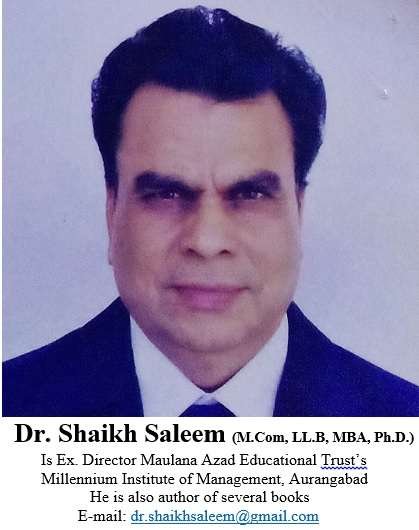‘One Nation – One Election’: A Constitutional Dilemma and Logistical Nightmare, opines Dr. Shaikh Salim, prominent author of several books and articles, scans the proposal recently submitted by a high-level committee headed by former President Ram Nath Kovind which, the cabinet approved unanimously. During a recent cabinet briefing immediately after the proposal was approved, Minister for Information & Broadcasting, Ashwini Vaishnaw said, “Now the committee recommendations will be open for discussion across the nation. Various forums like, federations, groups, industrial associations, unions, etc., are appealed to participate and contribute their feedback.” He specifically appealed to the youths to participate in this discussion and give the feedback.
As India grapples with the BJP’s proposed ‘One Nation, One Election’ initiative, we face a critical juncture that could reshape our democratic landscape. This ambitious project, while touted as a solution to electoral inefficiencies, threatens to undermine the very foundations of our federal structure and poses unprecedented logistical challenges.
The BJP, after falling short of its “Abki Baar 400 Paar” slogan and securing only 240 seats, has formed a coalition government. Unable to fulfill its objectives through this arrangement, the party has now initiated this second attempt to consolidate power. However, a closer examination reveals that this project is likely to fail due to numerous practical and constitutional hurdles.
Proponents argue that simultaneous elections will reduce costs, ensure stable five-year terms for governments, and prevent policy paralysis caused by frequent enforcement of the Model Code of Conduct. While these goals seem laudable on the surface, the reality is far more complex.
‘One Nation, One Election’ – Cost Reduction?
Let’s first address the claim of cost reduction. Contrary to this assertion, simultaneous elections would require a tripling of resources – from electronic voting machines to polling staff and security forces – all deployed concurrently. The Election Commission of India (ECI), already stretched thin during phased elections, would face an insurmountable challenge in managing this scale of operations while curtailing expenses. Moreover, India’s diverse geographic and demographic landscape, from the remote Himalayas to densely populated urban centers, adds layers of complexity to this logistical puzzle which, in no way may allow reduction of cost.
Recent electoral experiences further highlight the impracticality of this proposal. During the 2024 parliamentary elections, the ECI couldn’t conduct simultaneous polls in Jammu and Kashmir due to security concerns. If simultaneous elections in one state proved challenging, how can they be implemented nationwide? Similarly, of the four state assembly elections due recently (Haryana, Jammu and Kashmir, Jharkhand, and Maharashtra), only two were announced simultaneously. The Delhi government’s desire to align its assembly elections with Maharashtra’s underscores the ad-hoc nature of such synchronization attempts.
The project also proposes holding local body elections 100 days after the parliamentary and state assembly polls. Local elections, requiring even more resources than national and state polls, would strain the ECI’s capacity to its breaking point. Furthermore, the suggestion of mid-term elections for dissolved assemblies, but only for their remaining terms, is fraught with practical issues. How viable is it to conduct elections for periods shorter than a year, considering the costs and political parties’ likely reluctance? This scenario could lead to increased imposition of Governor’s rule, further centralizing power at the expense of state autonomy.
‘One Nation, One Election’ – Constitutional Challenges
Beyond these practical concerns, the legal and constitutional challenges are even more daunting. Implementing this project requires numerous constitutional amendments, including changes to Articles 83 (duration of Houses of Parliament) and 172 (duration of State Legislatures). Such sweeping changes need a two-thirds majority in both houses of parliament – which the current government lacks. Moreover, consent from a majority of states seems unlikely, given the BJP’s projected performance in upcoming state elections.
The BJP’s decade-long rule has been marked by controversial policies that have raised concerns about the centralization of power. The abolition of the Planning Commission, perceived media control, and the use of agencies like the ED and CBI against opposition figures have all contributed to a sense of democratic erosion. The 2016 demonetization and the hasty implementation of GST stand out as examples of policies that have had far-reaching economic consequences.
While the government has provided 5 kg of free food grains monthly to 800 million Indians for a decade, this policy has failed to address the root causes of poverty. Instead of fostering dependency, the focus should shift to creating sustainable employment opportunities that promote dignified, self-reliant livelihoods. This approach would not only boost economic growth but also enhance the overall quality of life for millions of citizens.
The ‘One Nation, One Election’ initiative appears to be a strategy for prolonged power retention rather than genuine reform. If the government’s intentions are truly focused on national progress and prosperity, it should address pressing issues like unemployment, inflation, agrarian and SME crises, rising government debt, and foreign policy challenges, particularly regarding Chinese aggression.
Instead of this potentially destabilizing overhaul, we should consider more targeted reforms. Strengthening the ECI’s autonomy, implementing robust campaign finance regulations, and leveraging technology for more efficient electoral processes could address many concerns without compromising our federal structure.
‘One Nation, One Election’ endangers ‘Democracy’
In conclusion, while the idea of simultaneous elections may seem appealing at first glance, its implementation would be a Herculean task fraught with constitutional, logistical, and practical challenges. As we debate this proposal, we must remain vigilant in protecting the diverse and federal nature of our democracy – a system that has, despite its imperfections, served as a beacon of hope and representation for over a billion people.
Also read: https://newswavepost.com/wakf-properties-third-largest-in-india-why-muslims-are-so-poor/
